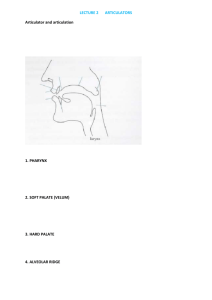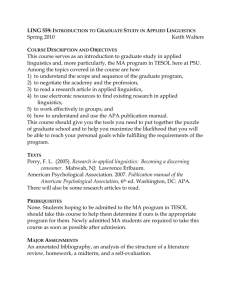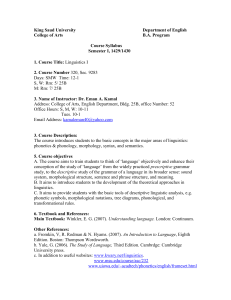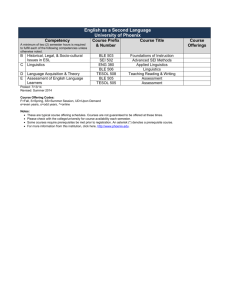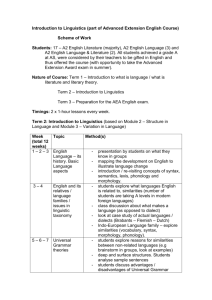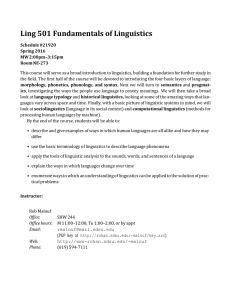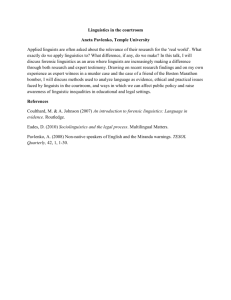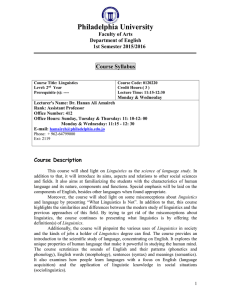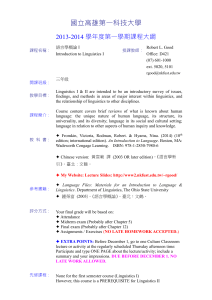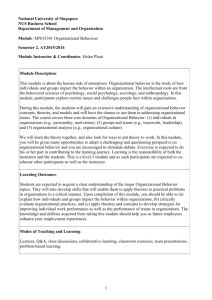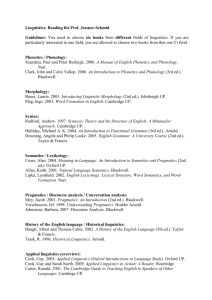Grad LINGUISTICS - USC Upstate: Faculty
advertisement
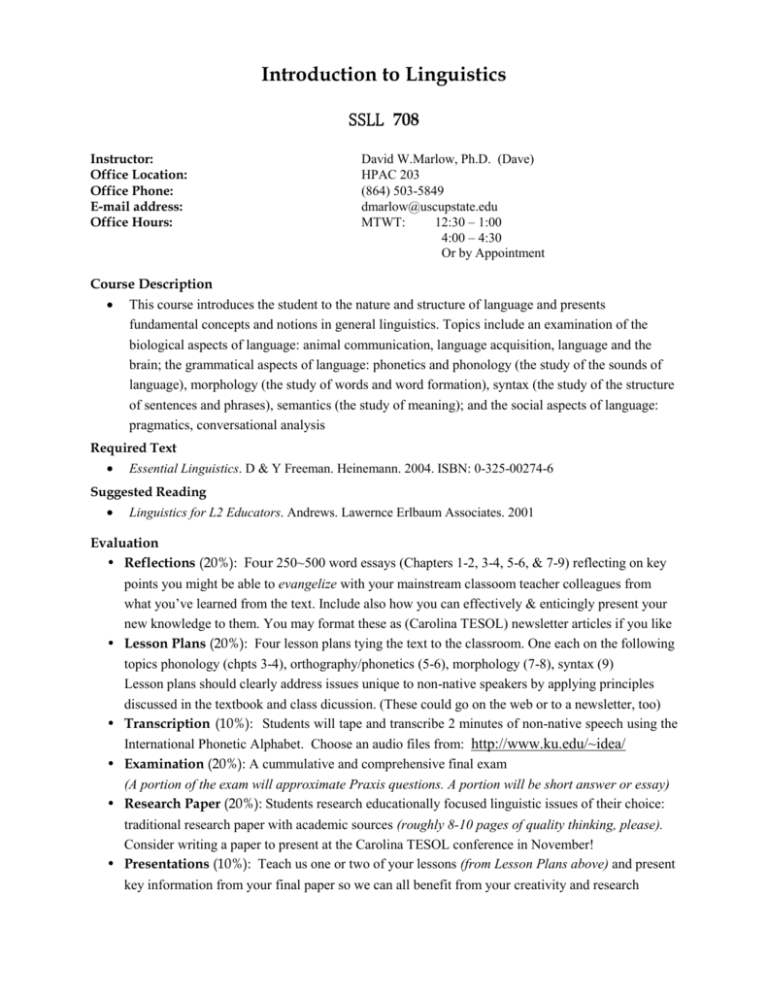
Introduction to Linguistics SSLL 708 Instructor: Office Location: Office Phone: E-mail address: Office Hours: David W.Marlow, Ph.D. (Dave) HPAC 203 (864) 503-5849 dmarlow@uscupstate.edu MTWT: 12:30 – 1:00 4:00 – 4:30 Or by Appointment Course Description This course introduces the student to the nature and structure of language and presents fundamental concepts and notions in general linguistics. Topics include an examination of the biological aspects of language: animal communication, language acquisition, language and the brain; the grammatical aspects of language: phonetics and phonology (the study of the sounds of language), morphology (the study of words and word formation), syntax (the study of the structure of sentences and phrases), semantics (the study of meaning); and the social aspects of language: pragmatics, conversational analysis Required Text Essential Linguistics. D & Y Freeman. Heinemann. 2004. ISBN: 0-325-00274-6 Suggested Reading Linguistics for L2 Educators. Andrews. Lawernce Erlbaum Associates. 2001 Evaluation • Reflections (20%): Four 250~500 word essays (Chapters 1-2, 3-4, 5-6, & 7-9) reflecting on key points you might be able to evangelize with your mainstream classoom teacher colleagues from what you’ve learned from the text. Include also how you can effectively & enticingly present your new knowledge to them. You may format these as (Carolina TESOL) newsletter articles if you like • Lesson Plans (20%): Four lesson plans tying the text to the classroom. One each on the following topics phonology (chpts 3-4), orthography/phonetics (5-6), morphology (7-8), syntax (9) Lesson plans should clearly address issues unique to non-native speakers by applying principles discussed in the textbook and class dicussion. (These could go on the web or to a newsletter, too) • Transcription (10%): Students will tape and transcribe 2 minutes of non-native speech using the International Phonetic Alphabet. Choose an audio files from: http://www.ku.edu/~idea/ • Examination (20%): A cummulative and comprehensive final exam (A portion of the exam will approximate Praxis questions. A portion will be short answer or essay) • Research Paper (20%): Students research educationally focused linguistic issues of their choice: traditional research paper with academic sources (roughly 8-10 pages of quality thinking, please). Consider writing a paper to present at the Carolina TESOL conference in November! • Presentations (10%): Teach us one or two of your lessons (from Lesson Plans above) and present key information from your final paper so we can all benefit from your creativity and research Marlow 2 708: Intro to Linguistics Assignment Deadlines • All work must be turned by the assigned date and time unless specifically approved in advance by the instructor. Extensions may be granted if requested the class period before an assignment is due, but will result in a 10% reduction in the grade on the assignment Plagarism • Both formal papers must be submitted to Blackboard for an automated plagiarism check. Posting of the papers at least 24 hours in advance of the deadline to self-check for unintentional plagiarism is recommended. Penalties for plagiarism, even if it’s unintentional, range from failure on an assignment to failure in the course to an appointment with the academic dean. Intentional plagiarism (circumventing the check above) will be dealt with in the most severe manner possible • You must do original work for this course. Work submitted to another class may be revised through the writing process and used here, but you may not simply turn in the same/very similar paper Accommodations • To request accommodation for a disability, please contact the Office of Disability Services (CLC 232, Phone: 503-5123) and see the course instructor as soon as possible Attendance/Participation • Daily attendance & particiaption in class is expected. If you need to miss more than one class period during this course, please discuss your situation with the instructor as soon as possible Grading A: 90%–100% B: 80%–86.99% C: 70%–76.99% D: 60%–66.99% F: below 60% B+ B+ D+ 87%–89.99% 77%–79.99% 67%–69.99% *** This syllabus is subject to change ***

